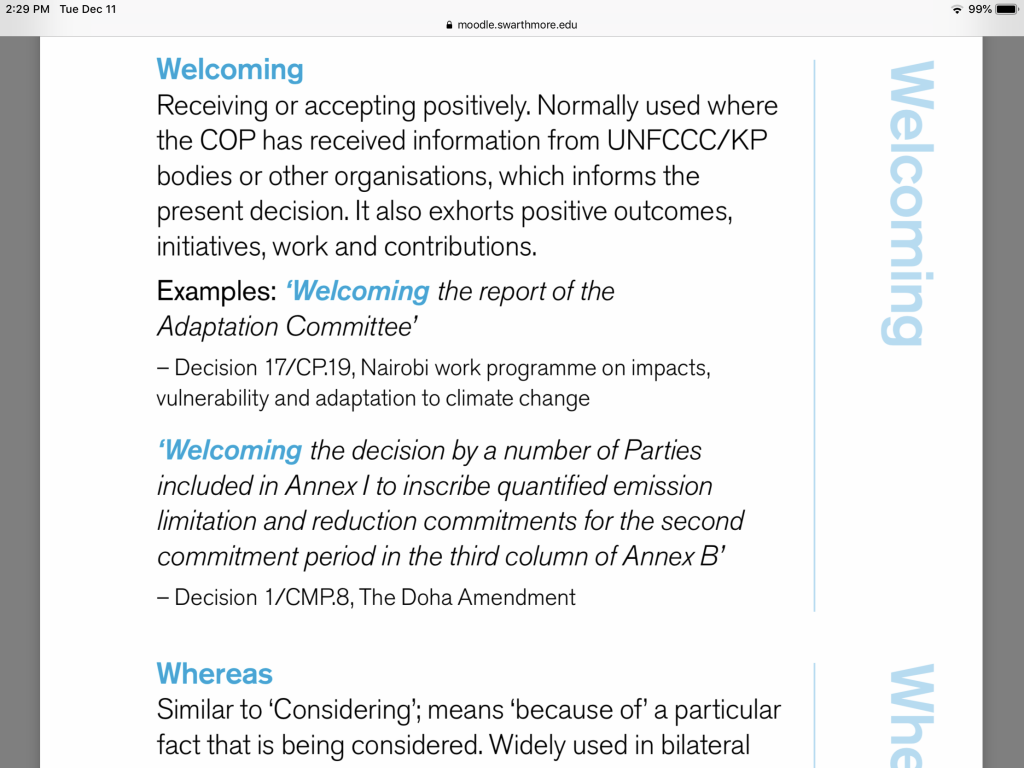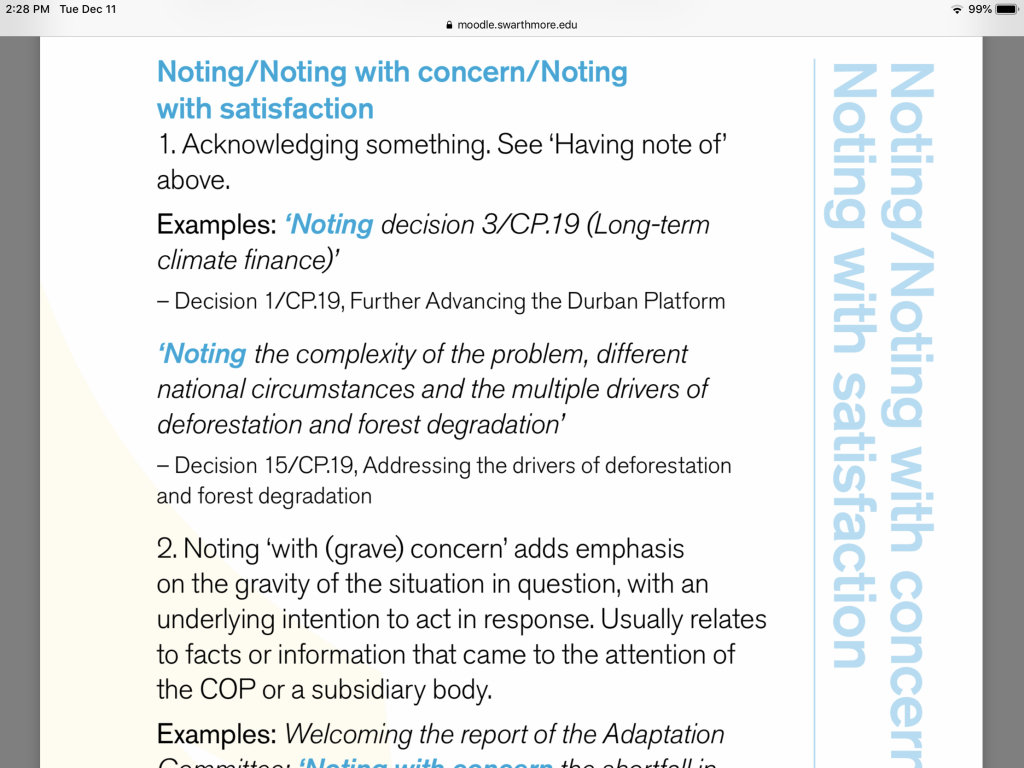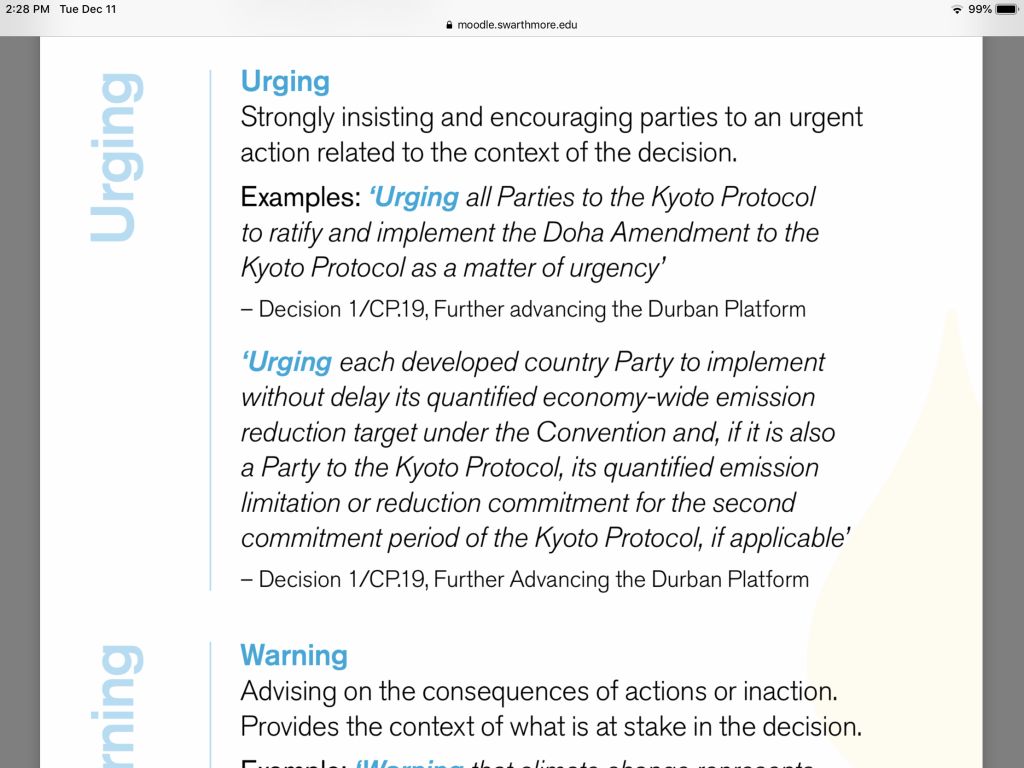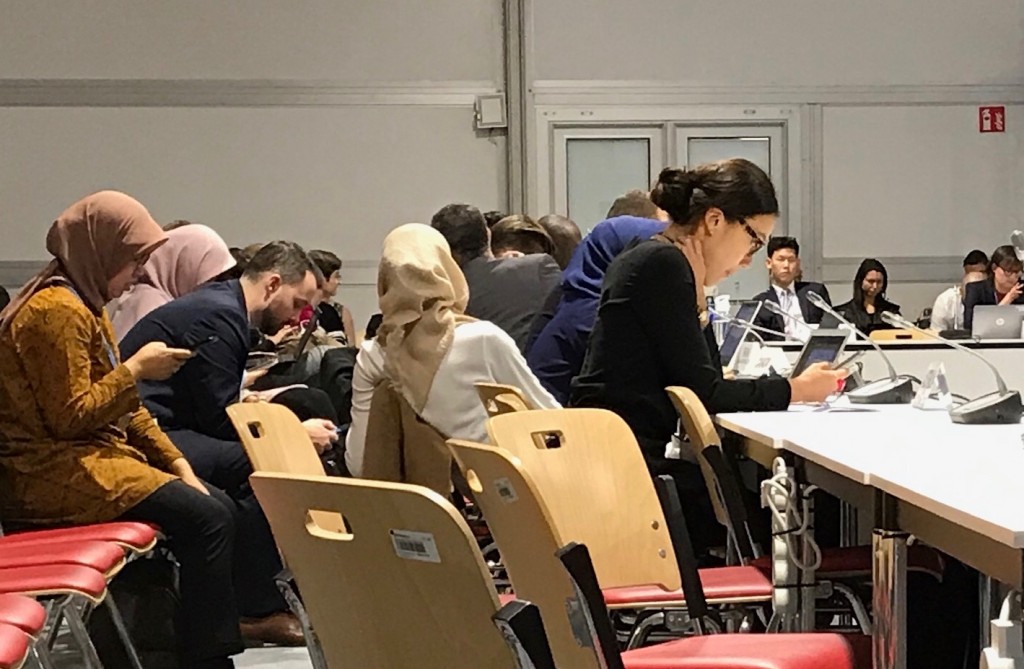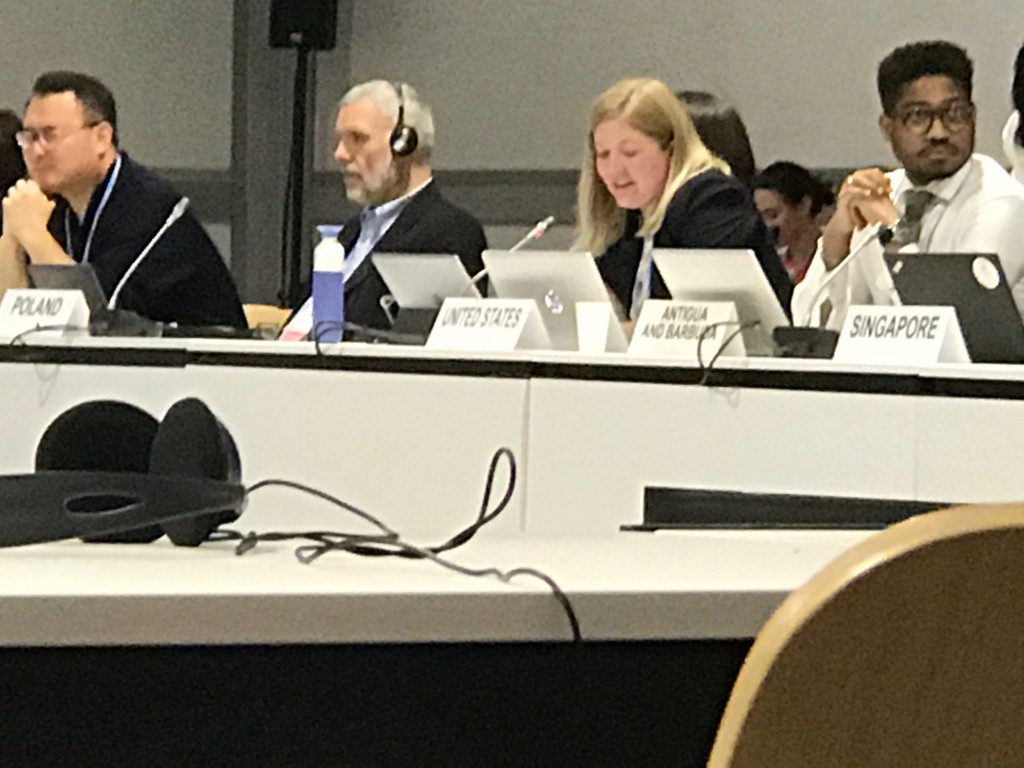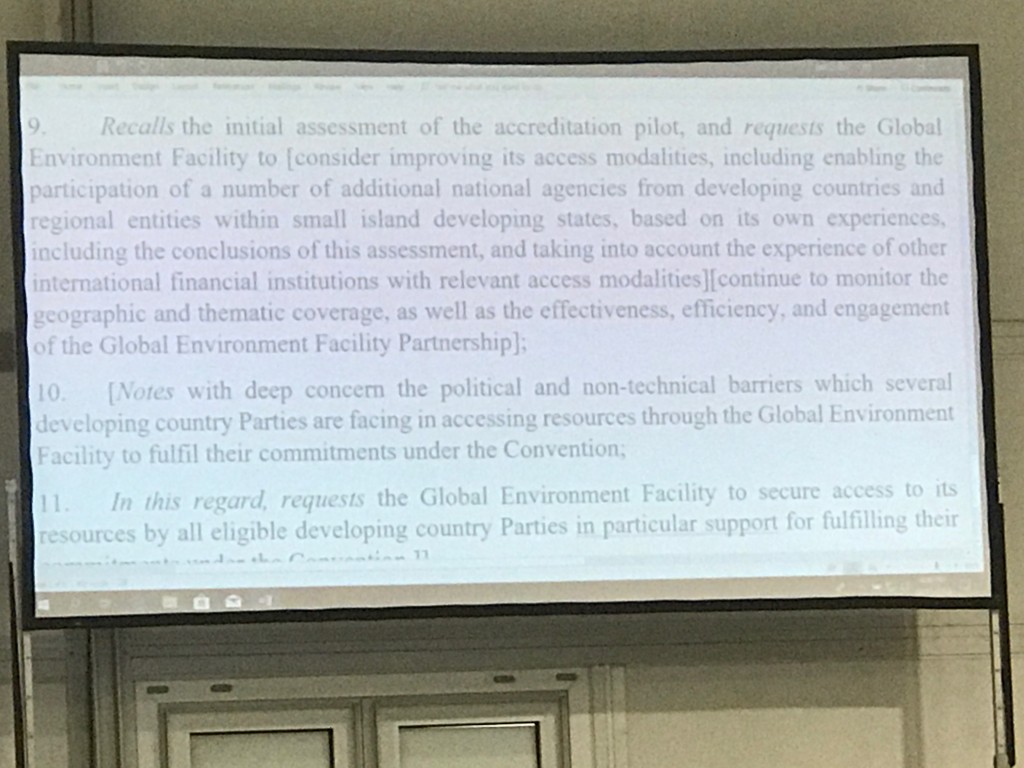The final open contact group on GEF (Global Environment Facility) guidance happened after lunch Tuesday. Some context: Iran believes it can’t get funding because the US blocks it. South Africa is speaking for the African Group of Nations, which itself is part of the G77 and China (in other words, most developing nations). China is not present in the negotiation, so presumably its interests are being represented by the G77 or other allies. The US doesn’t recognize Palestine as a sovereign nation. Japan is part of JUSCANZ along with the US; the EU is a Party to the COP in its own right, with its own representation in addition to individual state delegations. The EU joins JUSCANZ in the Umbrella Group (UG).
When people fight about language, it’s because they believe it has real-world consequences for them, for their ability to get funding for projects to protect their people (and perhaps in some cases, the funding will grease some palms–some of the delegates here are pretty frustrated with a culture of corruption in their home countries). (Me too.)
From the US side, we might note the difference between “Welcomes” and “Notes.” This is from a handbook on diplomatic language prepared for delegates from least developed countries:
Urging is another word the US tends not to like:
This was the language on the projection screens at the start of the meeting: 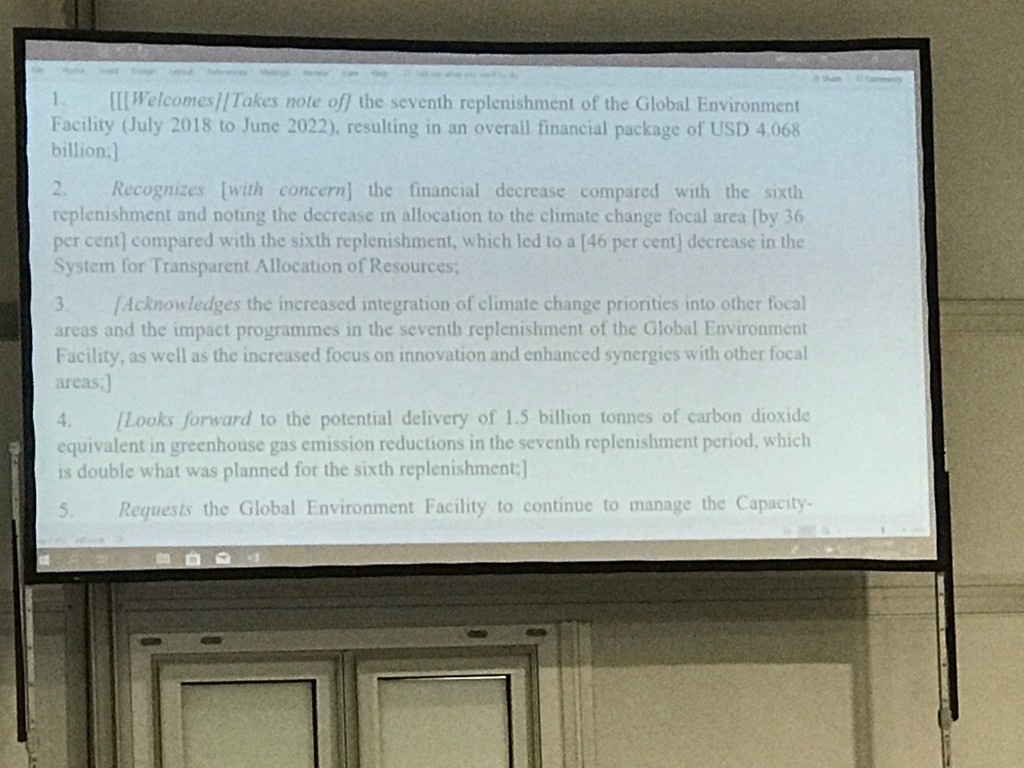
CoCHAIR
Introduction: It’s not done until it’s done. We will go through the text as far as we can, knowing that the whole decision is in the brackets until it’s done. If we can lift the [more local] brackets, that’s a good thing: finding common ground.
What you see on the screen is the last text…
IRAN
You just said the whole text is still in brackets. We request you keep old text until…
CoCHAIR
This is the old text.
PALESTINE
We may use the “Takes note,” so we can remove brackets for the first paragraph.
CoCHAIR
We have a proposal to change “welcomes” to “takes note”—the rest of paragraph one will stay as is. We can live with that? Good. Paragraph 2.
JAPAN
We can agree with “note” as long as don’t delete “with concern” in ¶2.
EU
We would like to keep “welcomes.” (Is the US blocking “welcomes” here or is a developing country unhappy with the low level of replenishment?)
IRAN
If Japan is proposing to link paragraph 1 and 2, we propose a linkage between 1 and 2 and 10 and 11.
Palestine and Japan are demonstrating flexibility. Iran is taking aim at later paragraphs that are a source of significant conflict between the US and most other countries.
CoCHAIR
We know everything is connected to everything, but let’s take it piece by piece. Let me give you some thoughts from the past. After replenishments, contributions are still welcome. In the last round, some developing countries contributed and increased their contributions. From the chair’s perspective, “welcoming” is appropriate. (The chair is pushing both sides: China and others who have some money could contribute to the fund too; but as chair, he’s holding to the majority view on “welcomes.” US, look for a little flexibility.)
Let’s move on. Some suggested that Parties could agree on absolute amounts instead of percentages. Could you express yourselves on that? EU?
EU
We would be ok with “recognizes with concern,” but would do full stop…
CHAIR
…or just take out the brackets…
EU
And the text with it.
CHAIR
Of course the text with it. (The Chair accidentally suggested that the EU would agree with the point it wanted removed from the text.)
IRAN
Percentage: why can’t we keep the percentage?
CoCHAIR
Other views? (Presumably, everyone already knows why the EU is proposing to remove the percentages, so the chair doesn’t want to dive into that question himself.)
SWITZERLAND
We are also willing to have not the percentage but figures as a compromise. We propose to retain “welcomes.” If the numbers are absolute amounts, “with concern” should go away.
CHAIR
All right. We are not making much progress. Paragraph 3. (He’s just trying to get through the text to see if there’s anything people are willing to agree on. So far, there’s not.)
SOUTH AFRICA
We are happy with “welcome.” We need to delete “overall financial package” from paragraph one. It’s misleading to have the figure. In paragraph three, we understand that the percentages may be questioned. If we take out 46 %, we should add the word “significant.”
EU
Neither numbers nor percentages are correct—the figure depends on the exchange rate, the time you compare numbers (at the beginning or end of the replenishment)…
CHAIR
You are opposed to numbers because these are misleading. We have a proposal from South Africa to capture the numbers with the word “significant.”
IRAN
Since we are starting with “recognizes with concern,” we have to say what we have concern about. We have to include the percentage for assessment tool, to give a dry sense of what we are concerned about.
CHAIR
I remind you—this is looking back at GEF 7 (replenishment): this is all just commenting on water under the bridge. Everybody younger than me in the room, which is everyone, should follow the example of looking forward. We’ll park it for the time being. (Many of these points seem valid to me, but I agree most with the chair that it’s time to get moving and find some agreement. South Africa’s compromise seems like one way to do that.)
Here is the lead negotiator for Australia, in black, leaning forward on her phone: many of the delegates really are very very young. There’s a lot of consultation going on via text and/or WhatsApp.
CHAIR
Para 3. (Whispered consultation) The Secretary is proposing becoming an inf inf (informal informal, closed to outside observers) to work.
They don’t kick us out, maybe because there is then some progress made on paragraph 4: substitute “projected” for “potential.” Everyone agrees that the current version of paragraph 6 micromanages the GEF, offering an inappropriate level of guidance. (The EU was particularly strongly opposed.) ANTIGUA AND BARBUDA offers a different version of paragraph 6, offering a way for new national entities to be certified to apply for funding from GEF. The US is relatively welcoming to this new wording but suggests this idea is covered in its new version of paragraph 9. Liz and the ANTIGUA rep have a quick huddle. ANTIGUA’s not ready to let go of his language for paragraph 6 yet.
Paragraph 9 is a stylistic mess, but 10 and 11 are the real minefield for the negotiation–a red line for the USA. The US is proposing to strike the first long stretch in brackets and substitute the second shorter stretch in brackets.
CoCHAIR asks the US to read out the proposed language on paragraph 9.
Is that acceptable?
IRAN
At this time we do not accept.
ARGENTINA
We are more comfortable with the original language.
LIBERIA
We have to consult with our groups—it is very important to have access for national agencies.
PALESTINE
We like the new language.
EU (arguing against the first bracket.)
Biodiversity, desertification, chemicals, etc. GEF has to follow this guidance for all of them. If we agree to this, GEF will have nothing for Stockholm. We have to look at the bigger picture. 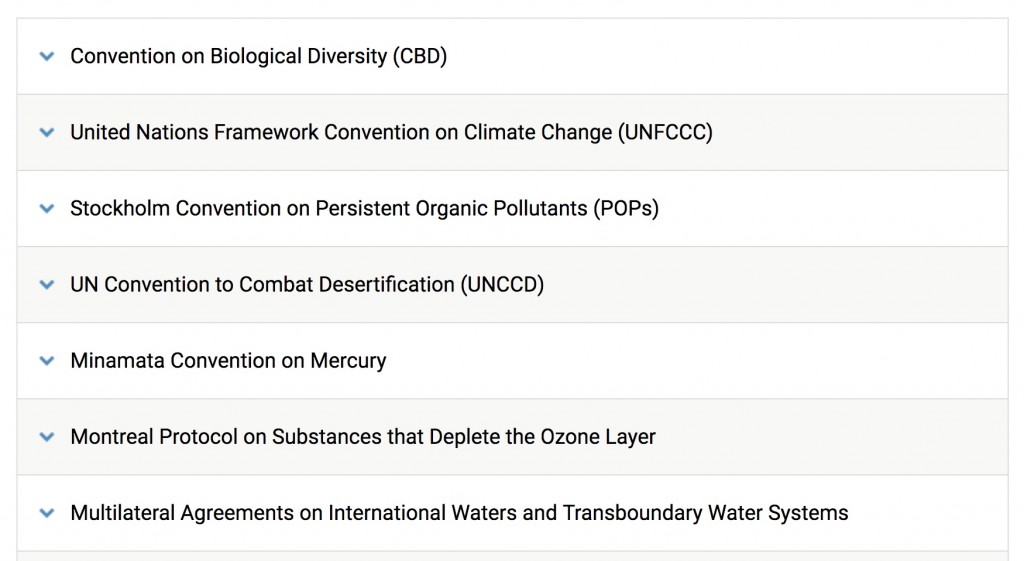
I am speaking in name of 38 countries who all together are biggest donors to GEF. (You people need to listen to us if you want our money.)
LIBERIA
GEF has a very complex portfolio and scope. We are working on finding a way to meet the goals of Paris agreement. The best way for us to have maximum impact is the GCF (Green Climate Fund). How did this session (on GEF) find its way into the text? GEF needs to find a way to see how best it can develop a business model to speak to national agencies in developing countries. I am consulting with my constituency. (Guidance to GEF is part of this agreement because GEF will fund the writing of reports mandated by the Paris Agreement, and this is the only mechanism for telling GEF that it needs to take on this new job. But LIBERIA is right that there’s some confusion about what this conversation is expecting of GEF–if I’m following correctly, which is a big if.)
CHAIR
Get a response within the remaining time, please. We will park it for now. (whispers.) I propose a compromise:
“Consider improving its access modalities, based on its own experience, and continue to monitor the geographic and thematic coverage, as well as the effectiveness, efficiency, and engagement of the Global Environment Facility Partnership.” (This cuts out a lot of the detail of the first bracket and replaces the specificity with “based on its own experience.”)
IRAN
I am trying to be naive and accommodate your good suggestion, however, Mr. CoChair, very frankly, the proposal you made is not a statement of the fact because the fact is that we haven’t seen any improvement in policies to be applied or actions to be taken. Therefore we are not able to accommodate your suggestion. We propose to keep the sentence as it is.
LIBERIA
I just noticed in the section it says within small island developing states! Why LDC’s are not mentioned here? We want to bring LDCs in.
In the climate finance landscape, national agencies are very important. The ultimate goal of trying to help them should include giving them tools and means to access them. In Liberia I work with many national agencies and the point of trying to work with national agencies cannot be overemphasized: it is important.
CHAIR
I was just trying to keep it short and clear. Please add LDCs. Para 10.
USA
As I think we all know, GEF guidance here is intended to apply only to policy, programming, and eligibility, and should certainly not guarantee or secure funding in any way…
CHAIR
This is an unacceptable red line to US. Who needs para 10?
IRAN
I am sorry I can’t go along with my colleagues from the US. The point of COP is to make sure all parties have access to GEF. We have highlighted the importance of making GEF transparent and central as per our common understanding. But GEF has not been able to fulfill finances and resources to all parties. Unfortunately, there are other influences on the GEF process to block access to funding developing countries. Paragraphs 10 and 11 are not a proposal from this delegation.
(IRAN made a reference to China requesting these paragraphs and another reference to the “diligence and cooperation of our colleagues here.”) I think Palestine reversed earlier support for the change, without rationale, but I can’t be sure. Maybe he got a text from someone.
CHAIR (after a little kerfuffle with EU about skipping over paragraphs 7 and 8, which had no brackets)
We have come to the end. We will submit this text with what we have now to presidency to give to ministers. Thank you all for your efforts on this one.
